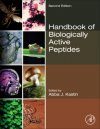![Handbook of Biologically Active Peptides Handbook of Biologically Active Peptides]()
Click to have a closer look
About this book
Contents
Biography
Related titles
Recommended titles
About this book
Peptides play a crucial role in many physiological processes, whether as neurotransmitters, hormones and antibiotics. Research has shown their importance in neuroscience, immunology, pharmacology, and cell biology. The rapid developments in peptide research over the past few decades make it very difficult for newcomers to gain an overview of the field.
The Handbook of Biologically Active Peptides is a definitive, large, all-encompassing reference that will be indispensable for peptide researchers, biochemists, cell and molecular biologists, neuroscientists, pharmacologists, and endocrinologists. Chapters are designed to be a source for workers in the field and will enable researchers working in a specific area to examine other related areas that they would not ordinarily be familiar.
Contents
I: Plant Peptides Section II: Bacterial/Antibiotic Peptides Section III: Fungal/Antifungal Peptides Section IV: Invertebrate Peptides Section V: Amphibian Peptides Section VI: Venom Peptides Section VII: Cancer/Anticancer Peptides Section VIII: Vaccine Peptides Section IX: Immunological and Infl ammatory Peptides Section X: Brain Peptides Section XI: Endocrine Peptides Section XII: Ingestive Peptides Section XIII: Gastrointestinal Peptides Section XIV: Cardiovascular Peptides Section XV: Renal Peptides Section XVI: Respiratory Peptides Section XVII: Opioid Peptides Section XVIII: Neurotrophic Peptides Section XIX: Blood-Brain Barrier Peptides Section XX: Other Peptide Topics
Customer Reviews
Biography
Abba J. Kastin was born in Ohio and educated at Harvard College and Medical School. After starting his work on neuropeptides at NIH, he went to Louisiana where he now holds an endowed chair at the Pennington Biomedical Research Center. Dr. Kastin has been made an honorary member of 7 foreign medical societies, has received 2 honorary doctorates (1 American and 1 foreign), and has won several national and internaitonal awards. Author of more than 800 papers (25,000 citations), he has been listed among the 100 researchers most cited in the scientific literature.




































